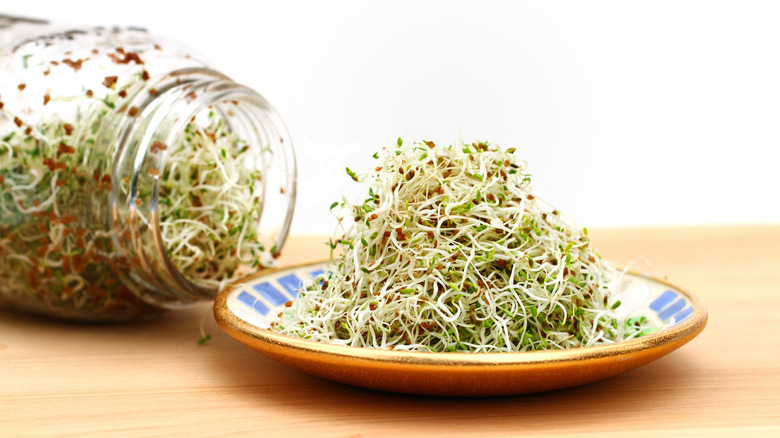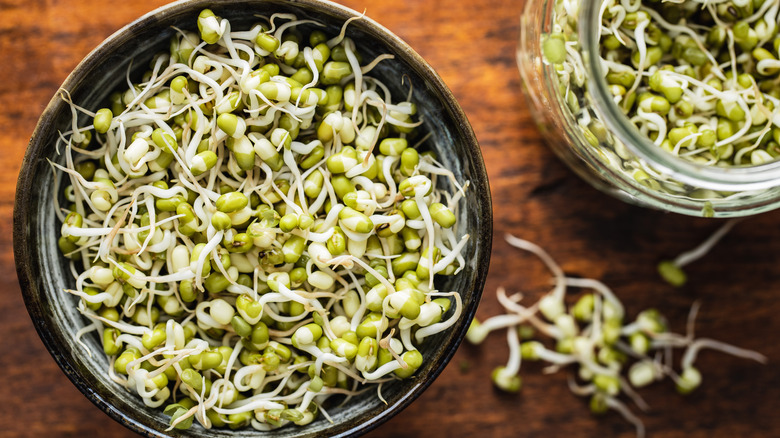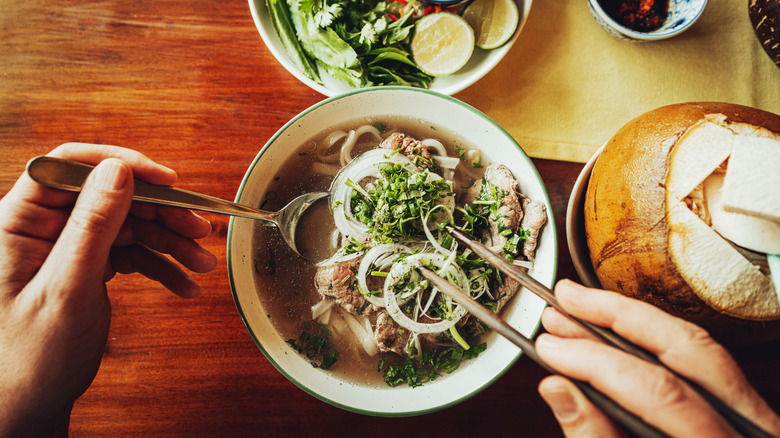Sprouts Are One Of The Healthiest Add-Ons To Give Your Sandwich Some Crunch
There's a case to be made that a crunchy element is essential to the perfect sandwich. If you're looking for the best way to add in that crunch, you don't have to reach for potato chips. While lettuce and onion are great alternatives, with the latter also adding plenty of flavor, you might be sleeping on a tasty, healthy addition: sprouts. They are similar to microgreens but grow in water rather than soil.
Sprouts, which can germinate from a variety of plants, including soybeans and leafy vegetables, aren't as widely used in sandwiches as they should be. However, you've probably seen them in Asian dishes like stir-fries and heavily spiced salads, recipes in which they're similarly prized for their texture. They grow quickly, too — often in less than seven days — so if you want to grow them yourself, you won't have to wait long until they're ready for a spot between your sandwich bread.
Sprouts offer plenty of nutritional benefits
According to the American Heart Association, sprouts are "nutrient-dense," meaning they pack a big nutritional punch in just a small amount. While their actual nutritional value changes depending on the type of sprouts you eat, the sprouting process is what actually makes these tiny plants super nutritious, increasing their levels of protein, magnesium, and different vitamins, among other things. Eating sprouts can improve digestion and help with gut health, too.
Chickpea sprouts, for example, pack up to 36 grams of protein in one serving, making them one of the most protein-rich sprouts you can eat; they also have 40% of the recommended daily value of iron. Adzuki bean sprouts and soybean sprouts are both good sources of vitamin C, with adzuki sprouts also providing 40% of the recommended daily value of iron. Plus, sprouts are generally quite low in calories and fat. Other types of sprouts include whole grain sprouts, like quinoa and buckwheat, and vegetable sprouts, like radish and mustard green sprouts.
One caveat: sprouts can be dangerous to consume
There is one major thing to consider before you pile sprouts onto your next sandwich: there is a risk of foodborne illness. While we might think of foods like raw meat when we think of bacterial contamination, the sprouting process occurs in water, making it easy for bacteria to make their way into these tiny greens.
The American Heart Association reports that salmonella, listeria, and E. coli can all find a home in sprouts due to the "warm, moist growing environment" these plants need to thrive. With that said, people with weakened immune systems, such as young children and older adults, are discouraged from eating them. Pregnant women should avoid sprouts, too. Thankfully, there are ways to limit the risk of illness.
The AHA says if you plan to grow sprouts yourself, you should sanitize the seeds with vinegar before planting them, which will help keep bacteria from growing. You can also cook them, but remember that cooking sprouts thoroughly reduces their nutritional value. If you purchase sprouts from the grocery store and want to eat them raw, make sure to at least rinse them well to remove some (but not all) of the potential bacteria.


